 полная версия
полная версия"Wee Tim'rous Beasties": Studies of Animal life and Character
And mother? Mother had lost some of her spring, but she had developed judiciousness, and a fine eye for country. It was this latter which, to her son’s amazement, usually kept her two bushes ahead. It was this which made him miss her as the day broke.
He had been to the very topmost pinnacle of a thorn-bush; halfway down he had leapt four feet on to a neighbouring hazel; he had looked back in self-congratulation at the abyss, and, when he had turned again, she had disappeared.
He waited for her as long as he dared, and then crept back subdued and lonely to his nest. Next evening perhaps he would see her again. But the next evening passed, and the next, and the next, and he never saw her again until the end.
Some other time I will tell you how he passed that summer, how he fought for and won a wife, how they built a nest together and made a store together, of the four little dormice, and of the sad fate that befel two of them. Here I can only tell the last scene.
It was late autumn. His wife had already felt the coming of winter, and retired to her six months’ sleep. He himself had sealed her in.
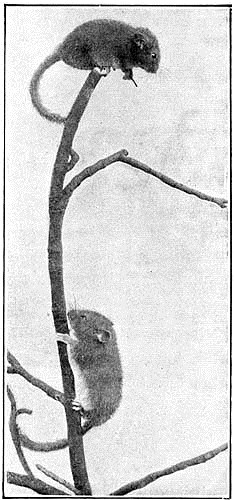
MOTHER WAS CLIMBING PAINFULLY UP TO HIM.
He had taught the two small dormice how to build their nests (honeysuckle fibre and dead leaf), and pointed out the necessity of getting into them before Christmas. He had rebuilt his own nest in the same old hollow, for he knew that he could not hold out much longer.
With every light breeze that crept down the hedgerow now came the rustle of the falling leaf. Each night he had seemed less inclined to wake, and this night he seemed less inclined than ever.
The sun had scarcely set before he felt chilled and uncomfortable. To warm himself he did three minutes’ gymnastics. The end of them found him perched on the same old broken twig, and, when he looked down, even as before, mother was climbing painfully up to him.
It needed but a glance to see that she would not outlive the winter. Had she made a nest? No, she had not troubled. The hole she was in last year would do. Perhaps she would take his nest, he could easily build another. Most certainly she would not. He could help her to put some leaves into hers to-morrow. But that night came the first frost.
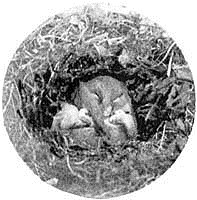
BUT THAT NIGHT CAME THE FIRST FROST.
THE PURPLE EMPEROR
Down by the brookside the Sallow drooped her sunburnt leaves despondently. Things were at their dullest.
Three months ago she had been a tree of importance. Her dark, slender branches had formed a fashionable rendez-vous. Each evening she had seen her golden catkins studded with opals—the eyes of soft, furry, blundering moths. Each day the bees had thronged to pay court to her.
Then came Palm Sunday. Her catkins were stripped from her, worn for a few hours in yokels’ hats, and flung aside. The moths came no more; the bees forsook her for the bluebells.
But the kingfishers cared nothing for her appearance. They nested, as usual, deep in the bank below, in a hollow formed by her roots.
The kingfishers were always in a hurry, and their colours were fussy and discordant. They flashed up and down the brook like a pair of demented fireworks. The whole bank reeked with the discarded meals of their progeny.
By the time the nestlings were fledged, the sallow wore its summer mantle, a down-lined cloak of green.
The interesting event had been a diversion. Now there seemed nothing to look forward to.
On the one side lay the meadow-land, stretching in unbroken monotony to the sky-line; on the other, the brook; beyond its wooded bank, more meadow-land.
The brook was not what it had been. Its waters were being drawn away to thirsty London, and herein lay the sallow’s chief vexation.
This year her upper boughs had never flowered. Summer arrived, and she had hoped against hope. They had never even put forth leaves.
To be prematurely bald is disheartening. This baldness was so premature as to be serious. It was the first warning of decay.
The Empress Mother came sailing over the hill, high in the sky as befitted her. Behind her, in the far distance, lay the white-ribbed downs, and, along their ridge, there stretched against the sky a thin, shadowy, broken line. It was the great oak wood, the dominion she had abandoned.
The Empress Mother was looking for a black sallow. Sallows there were in plenty in and about the great wood, but she wanted one all to herself; one fit for an imperial nursery. So she came with unerring instinct to the brook.
The air hung motionless in the grip of a midsummer noon. As she floated earthwards in stately majesty, the sunlight flung its radiance round her, and her broad, white ribbon gleamed on its velvet ground like molten silver.
The sallow humbly drooped her leaves as one who receives royalty.
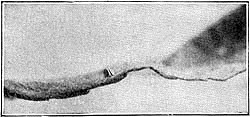
A SMALL, GREEN-YELLOW, TRANSLUCENT CONE.
For an hour the Empress Mother was busy. The leaves that she honoured were chosen with the nicest discrimination, and she honoured more than a dozen. Each, as she left it, bore on its upper surface a small, green-yellow, shiny, translucent cone, rounded at the top, flat at the base, and ribbed along its sides.
For the rest of the day the sallow held her head high.
There were fourteen eggs in all. Six reached maturity, but we are only concerned with one of them. Outwardly he was much like the others. A day’s exposure softened the yellow of his shell to olive. Save at the base he matched his leaf surroundings to a nicety. The base was suffused with a faint blush of purple. As the days passed the purple darkened to black, and shifted upwards, leaving the parts beneath it pale and colourless. It seemed to struggle towards the sun. On the eighteenth day the shell parted at the summit, and the little Emperor was hatched.
His youthful Majesty was mostly dark brown head. Such body as he could boast of was tapering and greenish. But his head caught the eye. It was well-nigh as large as the egg from which he came. Until he had fed he seemed indifferent to his changed surroundings.
The first thing that he ate was his minute discarded shell, and, from this slender meal, resulted disproportionate energy. He started forthwith on his travels, outwards towards the light as far as he could go. On the leaf point he built himself a pigmy throne of silk; and this was his citadel for a week. He only left it to feed, nibbling the leaf edge jerkily on either side of him. At the week’s end he lost his appetite. His body was now of a decided green—green with the finest powdering of yellow. About his waist the yellow fused into a crescent. Nine of him would have measured an inch.
On the eighth day he ceased feeding altogether. He sat with his hind-quarters anchored to his throne, his head and fore legs raised from off the leaf, rigid and immovable. For three days he grew yellower and yellower. Then his skin split down his back, and he successfully accomplished his first moult. In his short span he passed through many changes, but never one more quaint than this.
During his abstinence he had grown two horns. They branched straight out before him, bristling with short spines, a full third of his length.
He moulted once again before the winter, but this was merely a growing moult. Until October he never left his leaf point. Then Nature herself warned him to seek shelter. The weather was breaking. Rain he did not mind, but wind was different. Suppose his leaf was torn from its socket and hurled a hundred yards into the field?
Leaves were falling all round him, and it was time to take up his winter quarters. He spent a day or two in reaching them, yet they were not far off—merely the junction of his own particular branch to the parent stem. There, in the shelter of the fork, he spun himself a silken blanket, and in it he slept peacefully till April.
Peacefully through everything, and in spite of everything. Rain beat in drenching floods against the sallow, hailstorms lashed her branches, snow enshrouded her, hoar-frost bespangled her,—the little Emperor was quite unmoved. As the bark weathered from ebony to rusty olive, chameleon-like, he changed with it. This was the only outward sign he gave of life.
The catkins bloomed once more, and once more were rudely gathered. With the bursting of the leaf the little Emperor crept from his blanket. He found the world much as he had left it. Only the leaves were covered with soft down, smaller, and easier to bite. He was by now a full half inch in length, big enough to roam at large, and hungry enough to eat the tree. He started on the first leaf he came to, and, in five minutes, had gnawed a neat crescent out of it. There was method in his gnawing. He fixed his claspers firmly to the stalk, then stretched his head as far as he could reach, and nibbled the leaf edge backwards. When his feet reached his claspers, he commenced afresh.
Before the winter he had only fed at night; now he fed from sunrise to sunset, and at night as well. He fattened steadily, and in proportion, growing more slug-like every day. His horns but emphasized the likeness. He carried them well forward, and, at his rare sleeping intervals, they lay flat against the leaf. Thus with his swollen waist he seemed to fall away both ends. Three times he outgrew his coat. Each time he had eaten till it stretched to bursting point. Each time the process of disrobing was the same.
He dragged his slow bulk to some thick mass of leaves, selected the innermost of them, and spun a web of silk upon its surface. From this he hung himself head downwards. His weight helped him, and, in due course, the old skin split along his back, and he emerged resplendent in a fresh, untarnished, elastic livery.
Each moult was marked by some embellishment. Rusty olive gave place to pale sap green, this in turn to the green of the young willow-leaf, and this again to the green of lush grass. Nor was the change in body colour all. His sides in time were decked with slanting stripes of yellow. A V-shaped orange girdle marked his waist. Its buckle was a tiny splotch of crimson. His horns were tipped with russet brown, and head and tail alike were faintly tinged with blue.
Yet, for all his rainbow tints, Nature had decreed that he should live invisible. To this end she had coloured him to match his food plant. The lines of yellow on his sides broke the monotony of green, as veins break the monotony of a leaf. The blue about him was sister to the blue of summer that played amid the foliage with quivering transparent lights and shadows.
Nor did the cunning harmony end here. In form as well as tint he cheated observation. His outline, as he lay at rest, formed the most perfect outline of a twisted leaf.
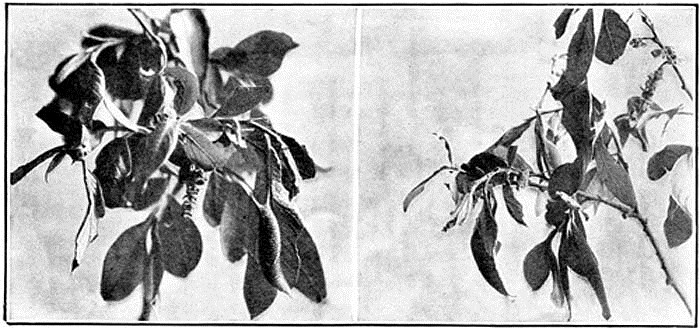
(L) GROWING MORE SLUG-LIKE EVERY DAY. (R) FOR ALL HIS RAINBOW TINTS, NATURE HAD DECREED THAT HE SHOULD LIVE INVISIBLE.
Birds passed him by unnoticed. Once, and once only, the ichneumon marked him down.
It was after his fifth and final moult. He was just a shade too light for nature, and the ichneumon has a pretty sense of colour. She buzzed viciously through the foliage, and settled for a moment on his back. She had reckoned without her host. His skin was indeed dangerously bright, but it was sensitive in proportion.
Before she could establish herself, a vicious back-sweep of his horns dislodged her.
Again and again she returned to the attack. Could she but pierce the skin, her paralyzing venom would quickly do its work. Then the murderous task would be easy. Eggs would be laid deep in the wound; grubs would hatch from them, and batten luxuriously on their unwilling host, sapping his strength, but cunningly avoiding his vitals, until they were full-fed. As they turned to pupæ he would die, and from caterpillar, or may be chrysalis, there would then issue, in place of gorgeous butterfly, a host of dingy hymenoptera. So would the race of ichneumons be preserved.
The little Emperor was fat and well-liking—an ideal créche for young ichneumons; but the little Emperor was very wide-awake.
The fly could find no foothold on him. He flung his armed head backwards to his tail. He pawed the air with six fore feet. He shook himself in paroxysms of fury. The fly cared little for the latter, but the horns were hard and formidable. They covered his whole body with their sweep, and struck with lightning speed.
At sundown she withdrew discomfited; the little Emperor’s horns had served him well.
His life was uneventful after this. When he had reached a length of two inches, his growth ceased. He fed less ravenously and less frequently. Three parts of his time he spent in contemplation of a special leaf. It was hard to tell wherein lay the fascination. He had spun a silken carpet on it. At rare intervals he tore himself away and snatched a hurried meal, but he infallibly returned to its friendly shelter. He rested on its mid-rib, facing the foot-stalk. His body was strongly arched and so compressed that the ridges of its crowded segments recalled the pile of velvet. His head and fore feet scarcely touched the surface. So he made ready for the second change.
For this even the favourite leaf was discarded. He roamed about the tree for days, seeking one that would suit his purpose. At last he found one, hidden in a thick-set cluster. It hung free, but he secured it in such fashion to its stem that a stiff breeze could hardly shake it. He stretched silken ropes from its edges and passed them completely round the foot-stalk. Then, on its under surface, he spun a little boss of silk, gripped it with his hind-claspers, and swung with easy confidence head downwards. For three days he hung thus motionless, yet within him there was a lively motion.
From the time he left the egg his life had been a dual one. The eye saw nothing but the outward mask, the caterpillar-form. Within this living vehicle that moved and spun and fed, lived the true butterfly—life within life, being within being.
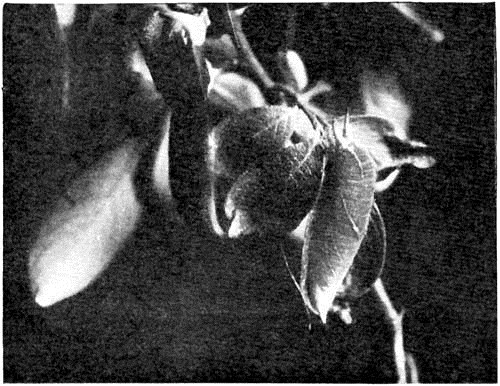
THE CROWDED SEGMENTS OF HIS BODY RECALLED THE PILE OF VELVET.
The caterpillar mask had done its work, and having done its work, must die. Yet one can hardly call such dissolution death. As it hung suspended, all the marvellous mechanism which had formed a moving, eating, spinning, sentient being, was absorbed into the chrysalis it covered. Merely the outer empty shell remained.
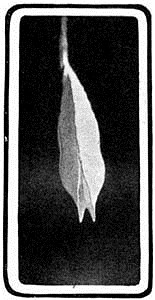
ON THE CHRYSALIS HEAD WERE TWO SHORT-POINTED HORNS.
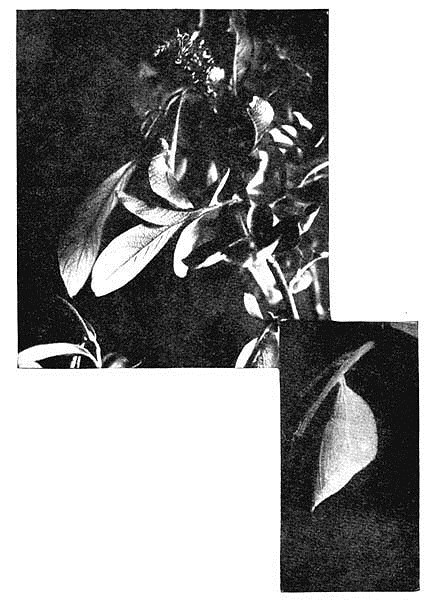
COLOUR AND FORM COMBINED THEIR SKILFUL MIMICRY. ITS FORM THE FORM OF THE SALLOW-LEAF.
On the fourth day this shell split cleanly at the tail, and, from the opening, the hind part of the chrysalis emerged. It jerked from side to side, to all appearance aimlessly. Yet there was method in its madness. A side-swing forced it deep into the boss of silk, and, in a moment, the hooks that studded its extremity were fast entangled. The chrysalis had its point d’appui.
Again the old skin cracked, this time behind the neck. The chrysalis head was free. On it were two short, flattened, pointed horns. A jerky movement of the shoulders followed—first expansion, then contraction. At each expansion the old skin slipped a trifle upwards. Turn by turn the segments of the body did their work, until it lay in gathered folds about the tail, just as the pushed-off stocking lies about the ankle.
But even so, the task was not completed. The skin must be got rid of. Its dull white mass, with dangling skeleton horns, was too conspicuous. Nature had armed the chrysalis with the needful tools, a grip attachment and a set of tiny sharp-edged hooks. The skin was fast entangled in the boss of silk. The chrysalis secured an independent foothold (using as stepping-stone the skin itself), spun itself from side to side, and cut the threads that bound it. It jerked lightly from leaf to leaf, until it reached the ground. The second change was accomplished.
Outwardly the chrysalis was nothing but an extra leaf. Colour and form combined their skilful mimicry. Its colour was the green of the sallow; its form, the form of the sallow-leaf.
For fifteen days it hung unchanged and motionless. On the sixteenth change was obviously impending. The upper segments had lengthened, the lower segments had darkened. On the twentieth day came the last great change of all.
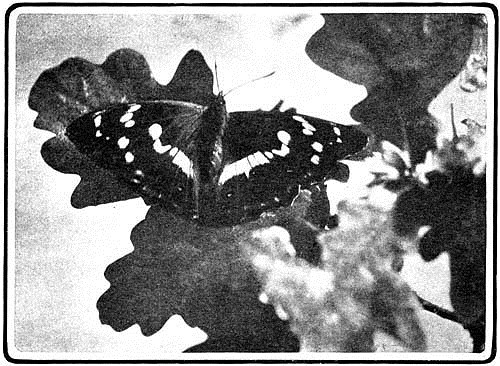
HE CHOSE THE LOFTIEST BRANCH OF THE LOFTIEST OAK IN THE FOREST.
It was a normal July day. Thunder was over the Downs. Now and again great rain-drops struck the sallow. They were few and far between, however. The thunder was content to grumble on the hills, leaving the valley to the sunshine. For all the midday heat the air was laden with moisture. This was at once both good and bad for the little Emperor, good because it made the bursting of his cerement easy, bad because it made the drying of his wings slow.
Still he had no choice in the matter; his time had come, and he must make the best of it.
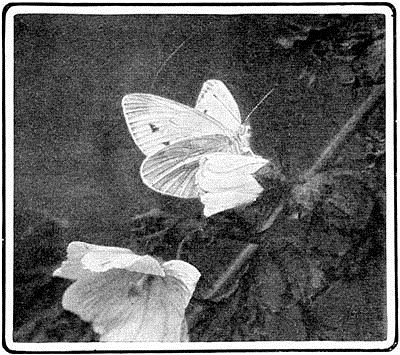
WHITES.
Barely a minute passed between the first yielding of the shell and his complete emergence. He issued head foremost, groping with bewildered legs for something to cling to. He struck the only thing within his reach, the chrysalis case itself. To this he clung with desperation, and he had need to. As yet he had no means of flight.
There is no room for wing expanse inside a chrysalis. Material for wings was lying ready on his shoulders, it was moisture laden, packed in crumpled folds, and lifeless.
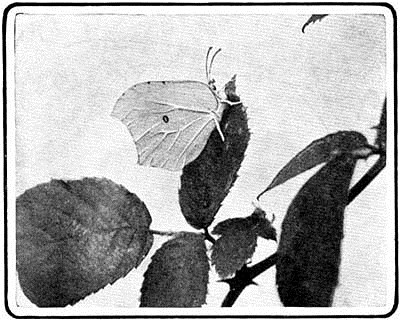
BRIMSTONES.
The thunder passed away seawards, drawing the valley moisture in its train. From eastward came a gentle drying breeze. It crept from leaf to leaf with its soft-whispered message until it reached the leaf that most had need of it.
The little Emperor trembled with excitement. His wings were coming into being. One by one, like petals of an opening flower, the clinging folds relaxed and told their secret. One by one the branching nervures hardened.
By sundown the great change of all was over. The Emperor, no longer little, was fit to mount his throne. Westward, as if in sympathy, the sky was flooded with imperial purple.
He chose the loftiest branch of the loftiest oak in the forest. Before him stretched an acre of clearing, thronged with his subjects. Every class was represented, or rather every class but one. Ages ago the Swallow tail disputed sovereignty with the Purple Emperor. Fortune declared against him, and he retreated, like some Hereward, to the fens. There to this day he holds a third-rate court.
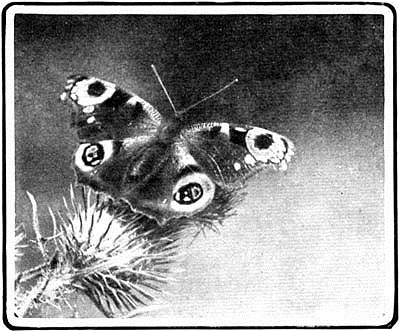
PEACOCKS.
It was a brilliant gathering that greeted the Emperor. Every colour, every form was there. Whites and brimstones, silver-studded fritillaries, peacocks, red admirals, and painted ladies, walls and ringlets, hairstreaks, blues, and skippers, even the little Duke of Burgundy, even the white and admirable Sibylla.
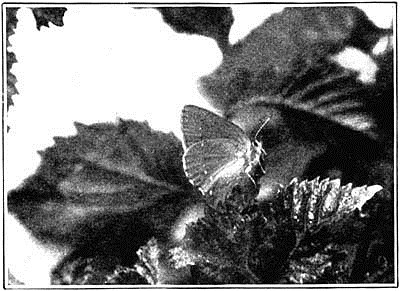
HAIRSTREAKS.
Happy midsummer children! They flashed their dainty tints from leaf to leaf, from flower to flower, their life one long-drawn revel in the sunshine.
From his high throne the Emperor watched and envied. He was tiring of lonely grandeur. Now and again he soared a hundred feet into the air, then with his wings full spread and motionless, sailed slowly back on to the summit of the oak.

ADMIRALS.
Never was flight more exquisite. As he rose, one caught the glint of the imperial purple; as he descended, its full glory was revealed. Nowhere in nature is the pure radiant effulgence of that purple surpassed. It is the purple of the rainbow itself.
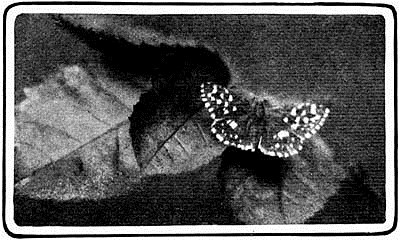
SKIPPERS.
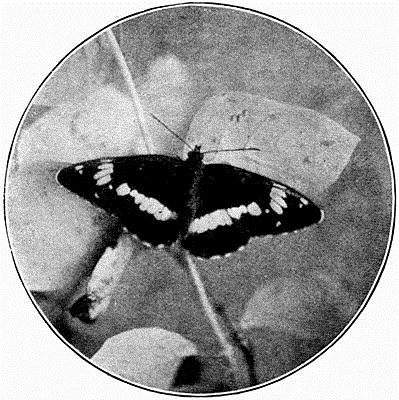
THE WHITE AND ADMIRABLE SIBYLLA.
Once, and once only, did he deign to touch the ground. Deep in the hollow behind the clearing, where the footpaths crossed each other, a shallow muddied pool had formed. In it the Emperor saw, from on high, his own reflection. Perhaps it was mere vanity that drew him closer; perhaps the fancy that he saw a rival; perhaps, but this is not likely, thirst. Close to the margin lay a rough-edged clumsy flint. On this he settled, and, Narcissus like, feasted his eyes on his own beauty. He nearly met Narcissus’ fate. It was the flint that saved him. He felt the shadow, almost before it reached him, but even so he rose too late. For half a minute he, the Purple Emperor, was prisoner in a boy’s straw hat. Had the hat covered the flint completely, he must assuredly have graced a cabinet. Fortunately for him the flint was just an inch too wide. The hat lay slant-wise across it, leaving a narrow crescent outlet on each side.
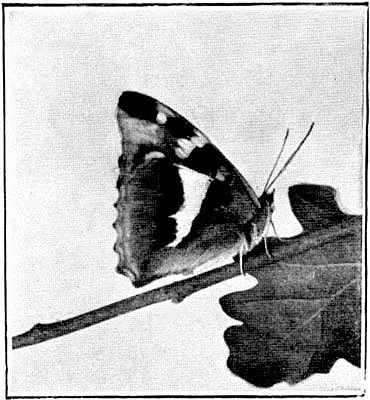
SHE SAT ON AN OAK PINNACLE OUTLINED AGAINST THE SKY.
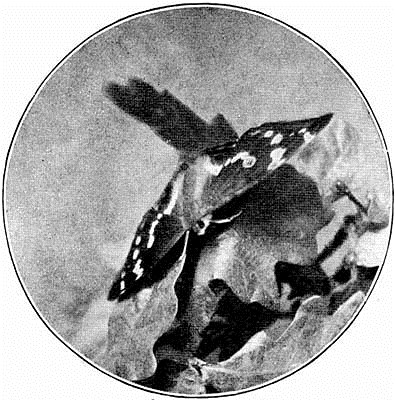
THE EMPEROR ALIGHTED WITHIN A FOOT OF HER, … AS HE OPENED HIS WINGS TO SHOW THEIR BEAUTY.
An old collector would have doffed his coat to cover hat and flint alike, would have sat beside them patiently till nightfall, would have done anything to make certain of his prize. But this collector was only a boy. With youthful recklessness he raised the brim a hair’s-breadth off the flint, and, in a moment, the Emperor was fifty feet above him.
It had been a near thing. Higher he soared, and higher, exulting in his freedom, and, as he soared, he sighted the Princess. She sat on an oak pinnacle outlined against the sky. Who was she? Whence had she come? On her wings was the broad white ribbon of butterfly royalty.
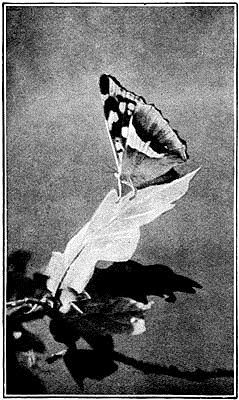
SHE TURNED HER BACK ON HIM.
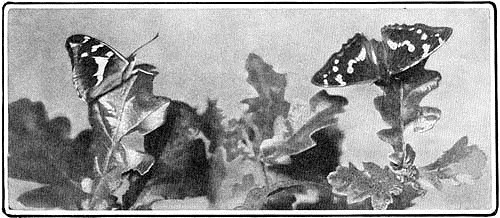
THE EMPEROR ONCE MORE SETTLED ON A NEIGHBOURING LEAF.
The Emperor alighted within a foot of her. For the first time in his life he felt humble. As he opened his wings to show their beauty, she turned her back on him; as he closed them again, she sought another tree. But the Emperor was not so easily baffled. He followed in hot haste, and once more settled on a neighbouring leaf. The Princess drooped her upper wings, as if she was asleep. But she was not. The Emperor crept along the leaves a little closer.
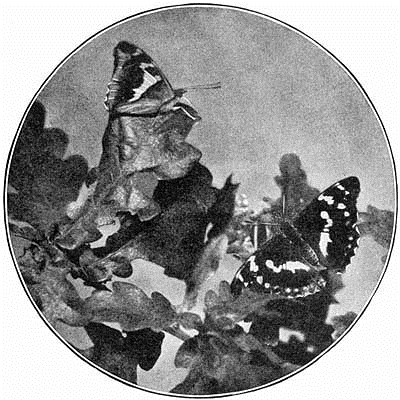
THE EMPEROR CREPT ALONG THE LEAVES A LITTLE CLOSER.
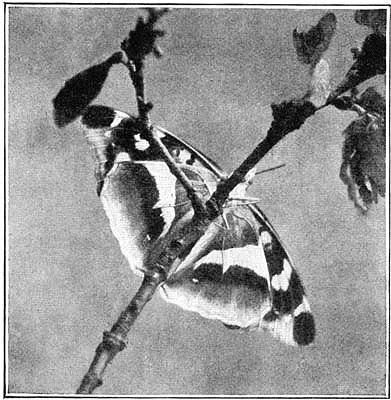
HE SHOWED HER THE BROAD, WHITE RIBBON THAT HE ALSO WORE.
It was the strangest courtship imaginable, for it was all on one side. From tree to tree they went, the Emperor flashing his purple in the sunshine, the Princess, to all appearance, unconscious of her suitor’s presence. Yet he tried every allurement he could think of. He circled round her, changing from purple to violet, from violet to velvet black. He soared above her skywards until he was a mere speck in the blue. He showed her the broad ribbon that he also wore. He even uncurled his slender saffron proboscis, and toasted his divinity in the sap of the oak-leaf.


